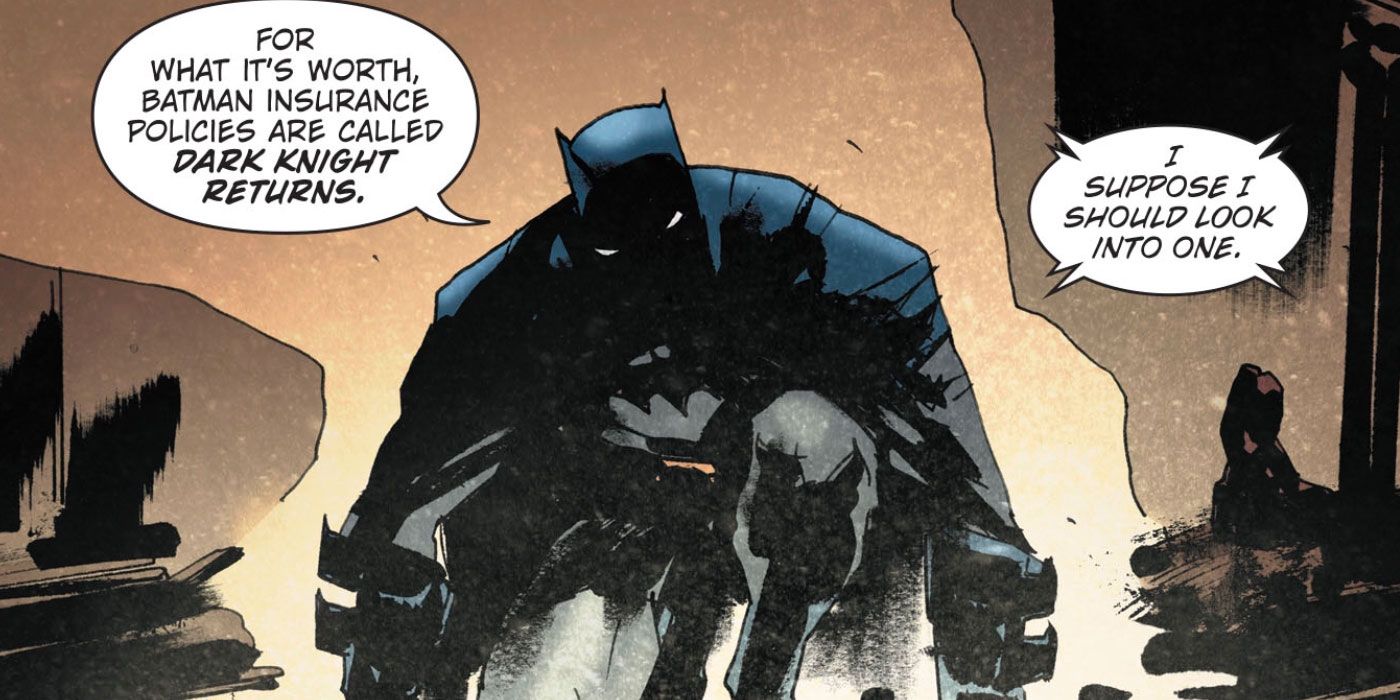WARNING: The following article contains major spoilers for The Batman Who Laughs #1 by Scott Snyder, Jock, David Baron, and Sal Cipriano, on sale now!
What seemed like a throwaway joke by Alfred Pennyworth in The Batman Who Laughs #1 turned out to show a little insight regarding how the citizens and financial institutions of Gotham City deal with having Batman in their lives. During a harrowing robbery-thwarting session, Alfred makes an offhand remark about banks having some sort of Batman insurance policy. Bruce quickly replies that they do, in fact, and tells Alfred to look it up.
Of course, anyone in their right mind would think this is one of few times a year Batman actually cracks a joke (or a smile for that matter), but the Caped Crusader soon double-downs on his claims and even reveals the name of these insurance policies as Dark Knight Returns.
Now, it's fair to say maybe Bruce was just on a roll in pulling Alfred's leg. The idea of having a form of insurance in which Batman retrieves stolen treasury deposits is a good investment is inherently silly. They also sound impractical, because, in all honestly, the details of how it would work are a bit foggy. Is the deductible lower on collateral damages if Batman secures the lost funds? (If any claims adjusters want to weigh in on the subject in the comments section, please do.) Also, when Alfred quips that he should invest in one, does this mean they are available to individuals? It would only make sense, wouldn't it? Having a volatile vigilante with deep pockets and an insatiable quest for justice in your city is unprecedented in the real world. Much like how some neighborhoods are in flood zones, does Gotham have "Batman Zones?"
RELATED: The Batman Who Laughs Is Back - But Which Bruce Wayne Did He Just Kill?
We've seen Batman destroy personal and public property in every iteration of the character, in comics, film and video games. From Val Kilmer driving up the side of an apartment building in Batman Forever, to Christian Bale leveling a parking garage in The Dark Knight, to the countless overpass supports we drove through with the Batmobile in Batman: Arkham Knight, it has become clear the residents of Gotham are in dire need of a "Dark Knight Returns" policy. After all, we're pretty sure GEICO won't cover a batarang shattering the windshield of your Honda Civic.
Now, the idea of Gotham City having some sort of damage control plan for Batman's actions isn't anything new. Recently, Sean Gordon Murphy's brilliant miniseries Batman: White Knight revealed that Gotham City has a budget allocated for disasters, and all of it was being spent on the damage done by Batman. Basically, it was Dark Knight FEMA. The only difference between this and what Bruce mentioned in The Batman Who Laughs, is that a "Dark Knight Returns" policy seems to be Batman-endosred. When the Caped Crusader learned of the funds being allocated for damages in White Knight, he was none too happy about it. Hell, the reformed Joker used the misuse of government funds as a platform to run his political career on.
RELATED: DC Reveals the Name of Batman Who Laughs' Bat-Punisher Sidekick
Batman, as a character, does pose a lot of questions with regard to how society should handle vigilantes. They are out there, after all. For quite a while there, the media was reporting on local heroes and leagues who acted more like neighborhood watches in capes than anything else. But there were those who would actually seek out crime and try to intervene. Of course, when they did so, the legality of the issue gets rather skewed. If Batman were to bust through your apartment in order to make for a quick route for apprehending a mugger, that's still breaking and entering. But as a tenant of that rental unit, what rights would you have to make a claim on the door Batman broke? Is there an inherent understanding that this sort of behavior is chill because the Caped Crusader is doing his thing? It would seem this is what comics and movies want us to believe, but we seriously doubt your landlord would be on the same page.


